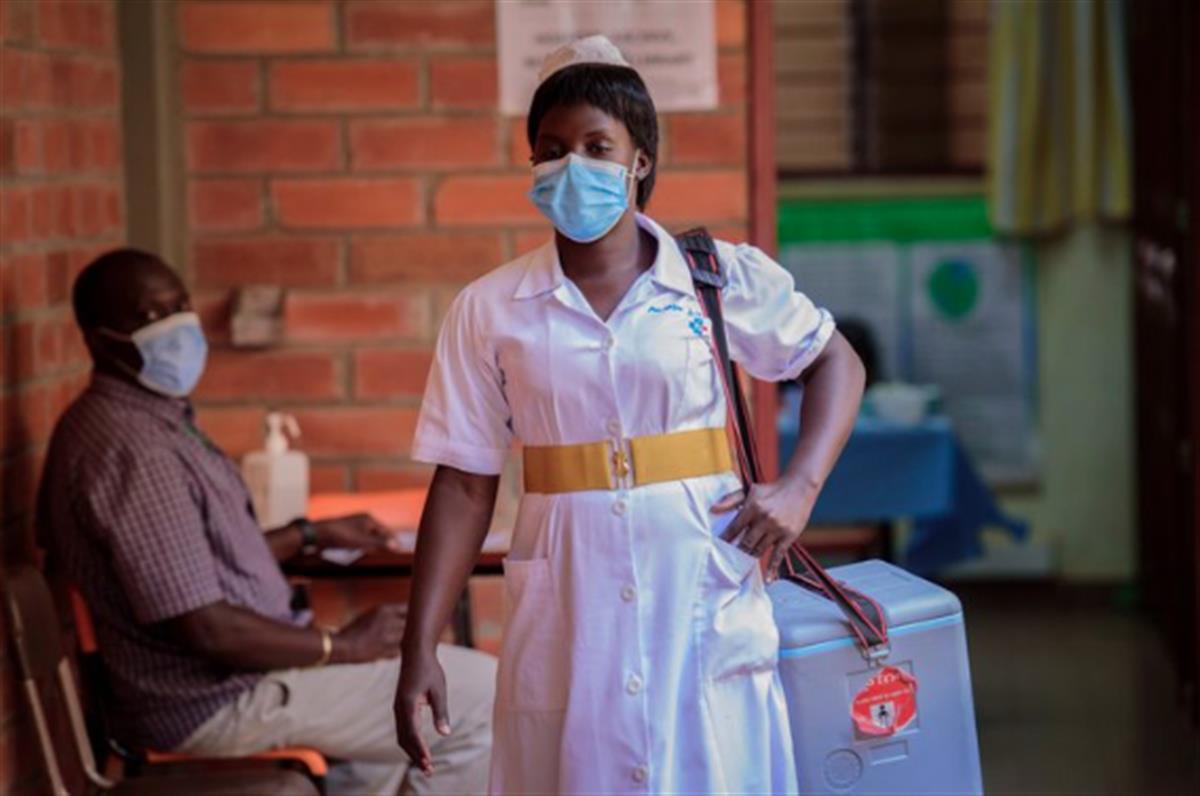
A nurse leaves a hospital in Gulu, Uganda after administering Covid-19 vaccinations, September 2021. Vaccine inequity has meant more than 50 countries have missed the World Health Organization's (WHO) target for 10 per cent of their populations to be fully vaccinated against Covid-19 by the end of September, including 39 out of 54 African countries. (Keystone/AP Photo/Nicholas Bamulanzeki)
Global Health | #Covid-19 | News
World must agree pandemic treaty and strengthen WHO, experts warn
by Pip Cook
World leaders must come together to agree on a new treaty to strengthen the World Health Organization (WHO) with more funding and greater powers to investigate pandemics, experts warned on Monday.
“Uneven and fragmented” efforts to combat the Covid-19 pandemic have allowed it to rage across the world, with persistent vaccine inequity leaving the poorest countries lagging behind while the “health and wealthy” in rich countries get boosters, experts from the Independent Panel for Pandemic Preparedness and Response (IPPPR) said.
The panel’s latest review led by its co-chairs, former New Zealand prime minister Helen Clark and former Liberian president Ellen Johnson Sirleaf, comes ahead of a conference of health ministers of the World Health Assembly (WHA) in Geneva next week.
'There is progress, but it is not fast or cohesive enough to bring this pandemic to an end across the globe in the near term, or to prevent another,' the panel said.
The report reiterated calls for urgent reforms six months after the panel published its first report in May, following a nine-month evaluation of how the WHO and member states handled the pandemic.
In their first report, the panel said a new global response system should be established to prevent further pandemics and urged countries to hold negotiations on a global pandemic treaty. Speaking today, the panel also called for new financing of at least $10 billion a year towards pandemic preparedness.
“We are encouraged to see some movement to address some of the gaps in global pandemic preparedness and response,” said co-chair Johnson Sirleaf speaking at the release of the report. “There are conversations happening in many of the right places, but the world is not moving with the speed this requires.”
Poorer countries left behind
More than 257 million people have reportedly been infected with Covid-19 and 5.4 million have died since the first cases were identified in Wuhan, central China in December 2019.
Health ministers from WHO’s 194 member countries will take part in a three-day special session starting on November 29 to consider negotiating a treaty. The panel urged them to ensure such a treaty would build preparedness for future pandemics, strengthen country’s legal obligations to alert the WHO to outbreaks and enable investigations and ensure fair access to vaccines.
'Strengthening the authority and independence of the WHO and developing new legal instruments are pivotal to the package of reforms required,' said the panel. 'WHO requires more funding and greater ability to investigate and report potential pandemics more quickly and independently.'
Johnson Sirleaf said vaccine equity was the “only solution” to fighting the pandemic. “Vaccine coverage is uneven, and people in the poorest countries still have almost no access to vaccines at all,” she said.
She cited figures showing that two-thirds of entire populations in high-income countries are fully vaccinated while in some low-income countries the average to have had a single dose is fewer than one in twenty.
More than 50 countries missed WHO’s targets for 10 per cent of their populations to be fully vaccinated by the end of September 2021. Most are in Africa, where only 15 out of 54 countries met the target, with the WHO's overall figure for those fully vaccinated currently 4.4 per cent.
The panel calculated that although at least one billion vaccine doses were available for redistribution to low-income countries through the Covax initiative by September this year, only 256 million have been delivered.
Other pitfalls such as inconsistent delivery, a lack of transparency and even vaccine-dumping “waste a vital opportunity to save lives,” she said.
Call to action
The panel's warning came on the heels of new research from the International Federation of the Red Cross (IFRC) on Monday that revealed women, people in urban areas and displaced people are bearing the brunt of the devastating socioeconomic impact of Covid-19, but are being left behind by inequitable distribution of vaccines.
The IFRC found a lack of preparedness made it harder for countries to build a comprehensive response to the pandemic allowing the public health emergency to spiral into a political and social crisis.
Panel co-chair Clark reiterated calls from more than 100 countries for a TRIPS waiver to temporarily lift intellectual property protections for Covid-19 vaccines and therapies - a point of contention set to be discussed at the World Trade Organization's (WTO) major biennial meeting in Geneva next week.
“To put it bluntly, global public health shouldn't be held hostage to manufacturers to purchase patents, many developed with public money, to spin into profit, with wealthy countries then willing and able to pay top dollar for the products and buy more than they need thereby excluding others from getting the access they need, ”said Clark.
The panel urged member countries to move beyond words and into action, both at next week's WHA meeting and the upcoming UN summit on pandemic response set to take place in New York in early 2022.
“Our call to member states is to get cracking at the WHA meeting, and to get cracking at the summit in New York,” she said. “We could make this the last pandemic, and we could end this one a lot quicker.”
#Covid-19 #Pandemic treaty #Vaccines #Vaccine equity
SOURCE: GENEVA SOLUTIONS